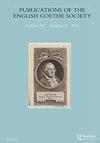From ‘Völkisch’ Culture to Dialectical Marxist Aesthetics: Staging Kleist’s Hermannsschlacht in the GDR
IF 0.1
3区 文学
0 LITERATURE, GERMAN, DUTCH, SCANDINAVIAN
引用次数: 0
Abstract
ABSTRACT The article investigates the aesthetic and political debates around two of the three historic theatrical productions of Heinrich von Kleist’s Die Hermannsschlacht in the GDR, in Thale in 1957 and in Leipzig in 1988. The stagings can be seen to represent the two opposing extremes of GDR cultural appropriation, and the shift from political propaganda in the 1950s to Marxist critical theatre of the 1980s. In this context, Kleist’s oeuvre provides an ideal analytical tool to identify how political pragmatism in many cases replaced both ideological and Marxist cultural approaches in the nation-building years, and how dialectical culture from the 1970s onwards eventually achieved the critical appropriation of Kleist’s works.从“Völkisch”文化到辩证马克思主义美学:在德意志民主共和国上演克莱斯特的《Hermannsschlacht》
摘要本文探讨了海因里希·冯·克莱斯特的《赫尔曼之死》三部历史性戏剧作品中的两部在民主德国、1957年在泰雷和1988年在莱比锡上演的美学和政治辩论。这些舞台可以被视为民主德国文化挪用的两个对立极端,以及从20世纪50年代的政治宣传到80年代的马克思主义批判戏剧的转变。在这种背景下,克莱斯特的作品提供了一个理想的分析工具,以确定政治实用主义在许多情况下是如何在建国年代取代意识形态和马克思主义文化方法的,以及20世纪70年代以后的辩证文化是如何最终实现对克莱斯特作品的批判性挪用的。
本文章由计算机程序翻译,如有差异,请以英文原文为准。
求助全文
约1分钟内获得全文
求助全文
来源期刊

Publications of the English Goethe Society
LITERATURE, GERMAN, DUTCH, SCANDINAVIAN-
CiteScore
0.10
自引率
0.00%
发文量
15
 求助内容:
求助内容: 应助结果提醒方式:
应助结果提醒方式:


